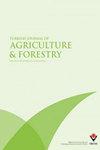甜瓜及其杂交后代果实挥发性成分的比较分析
IF 3
2区 农林科学
Q1 AGRONOMY
引用次数: 0
摘要
【目的】了解野生甜瓜与栽培甜瓜杂交果实挥发性成分的差异,为育种提供技术参考。[方法]采用高效液相色谱法(HPLC)和气相色谱-质谱法(GC-MS)对野生甜瓜、青麻坡和黄麻坡的挥发性成分进行分析。[结果]3个品种果实中均检出挥发性成分,其中野生品种46种,青花92种,黄花79种。主要挥发性成分为酯类、烯烃、醇类、烷烃和酰胺类。而且这三种挥发性物质是不同的。角鲨烯是野生甜瓜中的挥发性物质,在后代品种中未发现。【结论】青麻浦囊泡挥发性物质总量最多,黄麻浦囊泡挥发性物质总量最少。野生甜瓜果实中含有丰富的角鲨烯和柠檬烯,是一种具有较高植物价值的野生甜瓜育种资源。本文章由计算机程序翻译,如有差异,请以英文原文为准。
Comparative Analysis of Volatile Components in Fruits of Cucumis Melo L. and Its Hybrid Progeny
: [Objective] in order to understand the difference of volatile components in fruit of hybrid between wild melon and cultivated muskmelon, to provide technical reference for breeding. [Methods] the volatile components of wild cucumis melo L., Qingmapo and Huangmapo were analyzed by HPLC and GC-MS. [Results] the volatile compounds were identified in the fruits of these three cultivars, including 46 wild species, 92 species of Qingequao, and 79 species of Huangequao. The main volatile components are esters, olefins, alcohols, alkanes and amides. And the three varieties of volatile matter are different. Squalene, a volatile substance in wild cucumis melo, is not found in the progeny varieties. [Conclusion] the total amount of volatile substances in Qingmapo vesicle was the most, and that in Huangmapo vesicle was the least. The wild muskmelon fruit is rich in squalene and limonene, which is a kind of wild muskmelon breeding resource with high botanical value.
求助全文
通过发布文献求助,成功后即可免费获取论文全文。
去求助
来源期刊
CiteScore
4.20
自引率
6.90%
发文量
42
审稿时长
12 months
期刊介绍:
The Turkish Journal of Agriculture and Forestry is published electronically 6 times a year by the Scientific and Technological Research Council of Turkey (TÜBİTAK).
It publishes, in English, full-length original research papers and solicited review articles on advances in agronomy, horticulture, plant breeding, plant protection, plant molecular biology and biotechnology, soil science and plant nutrition, bionergy and energy crops, irrigation, agricultural technologies, plant-based food science and technology, forestry, and forest industry products.

 求助内容:
求助内容: 应助结果提醒方式:
应助结果提醒方式:


